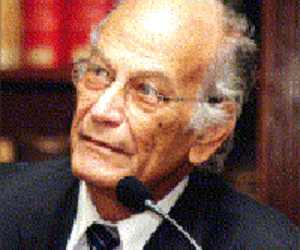Gustavo Kourí Flores
- Submitted by: manso
- Editorial Articles
- 07 / 23 / 2011

The Lancet, Volume 378, Issue 9788, Page 312, 23 July 2011. Leader of tropical medicine in Cuba. Born in Havana, Cuba, on Jan 11, 1936, he died in Havana on May 5, 2011, aged 75 years.
Gustavo Kourí Flores will be remembered for developing biomedical research in his native Cuba and encouraging a generation of investigators and practitioners in tropical medicine. “He was an educator of men and women of science, but never lost sight of the practical aspects of surveillance, prevention, and control of infectious diseases in countries in Africa, Asia, and Latin America”, said Eric Martínez, a researcher at the Institute of Tropical Medicine Pedro Kourí (IPK) in Havana, Cuba, and a consultant to the Pan-American Health Organization in Brazil.
For more than three decades, Kourí headed IPK, which is named for his father, who launched the study of tropical diseases and parasitology in Cuba.“Our institute was founded by his father in 1937, and it had a reputation”, said María G “Lupe” Guzmán, Kourí's wife of 31 years and Director of IPK's Department of Virology. But in the 30 years after Kourí took over as Director, she said, “the centre reached the level of a centre of excellence in the field of tropical medicine and infectious disease.
He played a key role in leading the centre to that level. I think that is his legacy, because the centre's work has had an impact not only in Cuba, but throughout the region.” Kourí worked as Assistant Director of Research at Cuba's National Scientific Research Center, and served as Assistant Dean of the School of Medicine and Vice Rector of research and postgraduate studies at the University of Havana before becoming Director of IPK. An expert in microbiology and virology, much of his research focused on dengue fever, as a result of an outbreak that occurred in Cuba in 1981 and included cases of dengue haemorrhagic fever.
Over the years, IPK expanded its work in bacteriology, virology, mycology, parasitology, and epidemiology, as well as its clinical work in infectious diseases and HIV/AIDS. During the dengue epidemic, Kourí worked closely with Guzmán, whom he had married the year before the outbreak occurred. “We worked closely on the research, on the results, especially determining the characteristics of dengue in that epidemic, setting up micro-diagnostics, determining risk factors for serious dengue”, Guzmán said.
Although Kourí was Director of IPK, “His work was that of any virologist, especially in the design of the studies and discussion of the results”, she said. He remained involved in that work in the following years during other dengue outbreaks in Cuba in 1997 and 2001.
Several international colleagues trace their association with Kourí to that first dengue epidemic. Duane Gubler, who headed the US Centers for Disease Control and Prevention's dengue programme in Puerto Rico at the time, recalls his first encounter with Kourí at an international meeting at which the Cuban researcher blamed the USA for introducing dengue to the island.
Gubler believes it is more likely that the disease was introduced by Cubans returning to the island from Asia. Ultimately, “we agreed to disagree”, and a working relationship became a friendship, said Gubler, who is Director of the Research Program in Emerging Infectious Diseases at the Duke-NUS Graduate Medical School in Singapore. “He was a genuinely nice person. He was one of these guys you can disagree with, but still be good friends. That doesn't occur very often any more”, Gubler said.
Guzmán says Kourí's legacy lies not just in his own scientific investigation, but in his dedication to forming the next generation of researchers. Rosmari Rodríguez, a researcher in IPK's Arbovirus Laboratory, agrees: “He used to say that our young people easily identified the things they lacked, but they did not adequately value what they had; it was therefore necessary to show them the many opportunities they had to become the great scientists they dreamed of being.”
In building Cuba's tropical medicine research capacity, Kourí's approach centred on “community values and community care, allied to a deep appreciation for how a community works, but bringing to that community real, hard-nosed science as well”, said Jeremy Farrar, Professor of Tropical Medicine at Oxford University and Director of Oxford University Clinical Research Unit in Viet Nam. “That combination of things typifies him, and it typifies the success that the health-care system in Cuba
has had over the past 40 years,” Farrar told The Lancet. Kourí's “strength was in public health”, Gubler said. “He was a principal driver of building the medical research programme in Cuba—the medical missionaries and the research that supported all of that. To me, that was good public health.”
Source: www.thelancet.com/journals/lancet/article/PIIS0140-6736(11)61157-4/fulltext
Comments